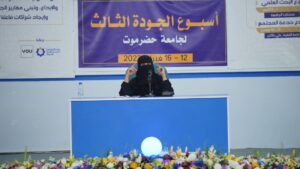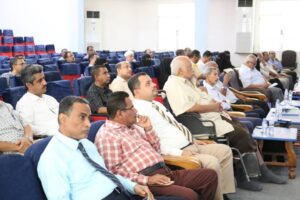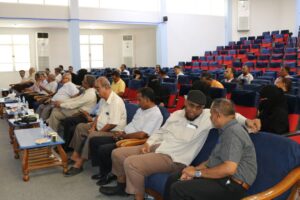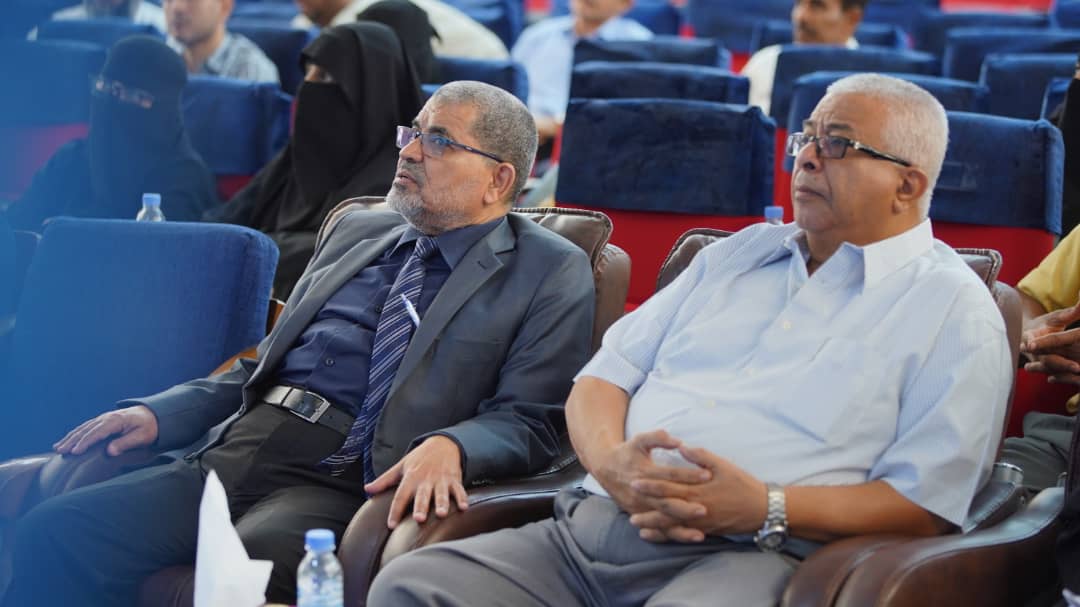On its fourth day, the third quality week at Hadhramout University looks with a forward-looking vision, accurate analysis of contemporary reality, and an upcoming ambition that forms future plans to prepare Hadhramout University to be a productive university. A productive university is a university that achieves the functions of higher education represented in teaching, scientific research and community service in an integrated manner. In addition to strengthening its budget by finding additional resources that make the university productive through its basic functions, such as consulting, preparing research, studies, and practicing productive activities that are compatible with the concept of the university and its basic functions. which reduces its dependence on its basic government revenues, however the basic functions of the university must be preserved and far from the commercial concept. Thus, the productive university model is a flexible model that achieves a balance between the three basic functions of the university.
The productive university does not seek to be in a competition with other productive institutions to achieve economic profit, however is satisfied with some activities that help it to achieve financial resources that help to cover its expenses

Dr. Warda Ahmed Al-Mohammadi presented a scientific paper in the workshop that was held on Wednesday 15/2/2023 within the activities of the 3rd quality week at Hadhramout University. It is a proposal to transfer the university in to a productive one. She explained that one of the justification for shifting towards a productive university in the economic aspect is the weak of the state to spend on university education, the need to expand university education to meet the increasing social demand, and the need for new specializations related to scientific and technological development to a high financial cost that the state may not be able to provide.
There was a social justification that was identified during the workshop as the competitiveness of universities is determined by the extent of their ability to face challenges, and thus they can maintain the continuity of improving their educational quality over time, which leads to higher competitiveness values and indicators for this university.
It also referred to a number of educational justifications, including:
-The large increase in the number of students enrolled in universities, which had an impact on the poor adequacy of education
-The need for educational courses and new developed alternatives
-Technological and information revolution in the field of knowledge production
-Inadequate equipment, laboratories, services, activity opportunities, and weakness in implementing the modern teaching methods
– The gap between higher education and the requirements of the labor market, especially in poor countries.
– Linking scientific research with development, and linking education with industry and production.
During the celebration of the thirtieth anniversary of Hadhramout University, it presented proposals, recommendations to come out with new visions that draw the features of Hadhramout University in the future. The paper set conditions through
– Finding integration between the basic functions of the university: (teaching, scientific research and community service) and looking at it as an integrated system that affects and is affected by each other.
– Reconsidering the process of preparing and training the student, to be a comprehensive preparation process for him , in the light of the expected learning outcomes with its various cognitive, mental, practical and general skills.
– The presence of flexibility and freedom in the regulations governing work in the productive university faculties;
In order to adapt to the changes that occur in society that require intervention by the producing university.
The general objectives of the productive university are
Developing the performance of the university educational system, improving its level of effectiveness and efficiency, and raising its productivity to achieve comprehensive quality
– Increasing the competitiveness of productive universities;
To comply with international standards and systems.
– Providing self-financing sources for the university education system that contribute to meeting its growing financial needs by activating the productive role and optimal utilization of the financial and human resources available to universities.
– Depending on technology, transforming universities into international houses of expertise, achieving integration between the education sector and the financial and business sector. In addition to the foundations for economic and social security for society.
– Contributing to solving the problem of unemployment among university graduates, and the employment of national labor, by achieving harmonization between the outcomes of university education and the needs of business institutions as well as the production of human cadres.
– Achieving the requirements of community development, by building a strong, cohesive society andParticipating in development and innovation
– Conducting research and studies related to various business fields;
To solve the problems facing the industrial, productive and service sectors
-Supporting innovative creative works for all university employees.
-Providing the infrastructure for communication and information technology in all university facilities to provide services to the community
-Providing an appropriate educational environment that allows the student to receive interactive education by specialized and qualified professors who are able to transform the student’s education from mere knowledge facts to a mixture of applied and technical knowledge and skills that enable the student to engage in productive activities.
In her presentation of the subject, the researcher exposed to a number of models of productive universities from Japan, America, Canada, Britain, Iraq, Saudi Arabia, Algeria, Sudan, and others




